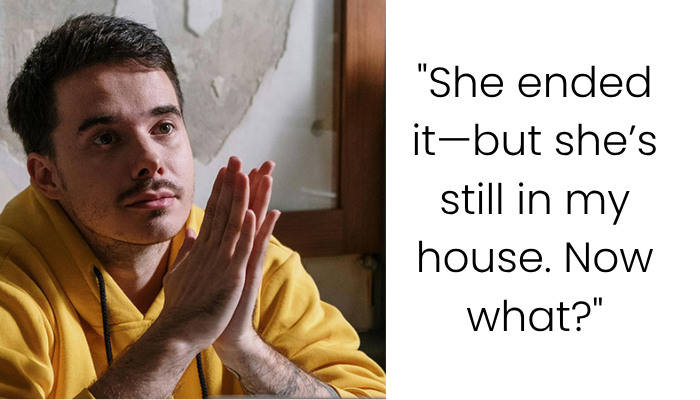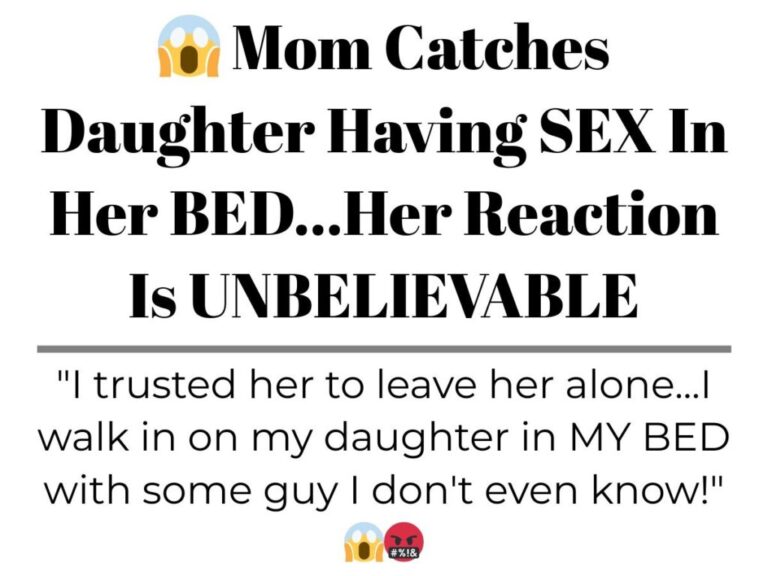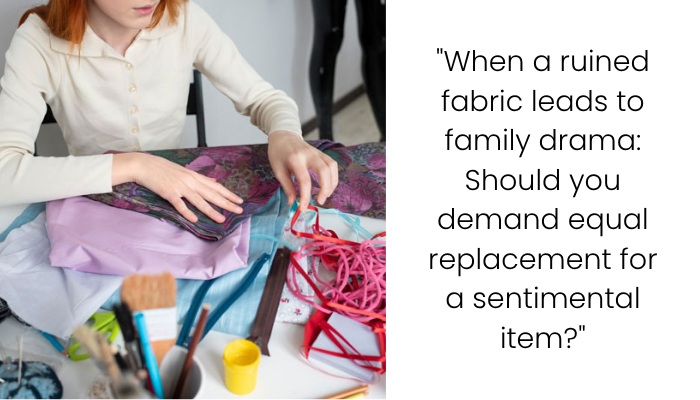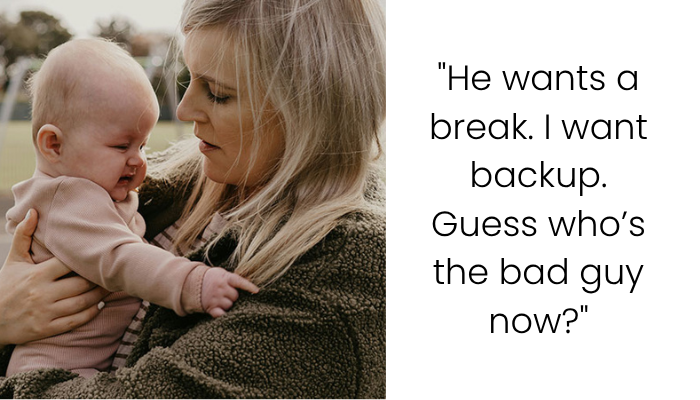My Childhood Best Friend Can’t Let Go of a Joke My Daughter Made — Two Years Ago
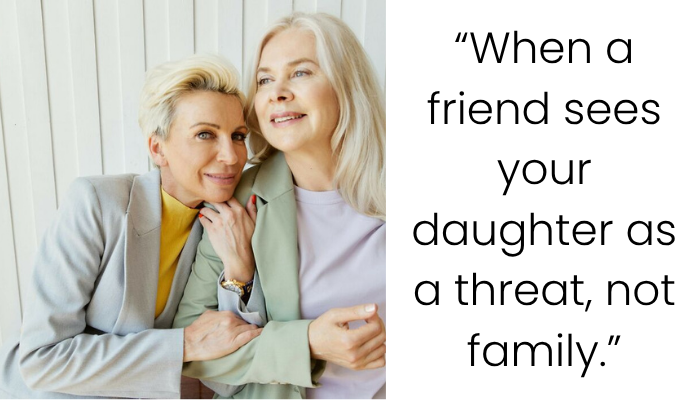
In this revealing Reddit post, Nessa1777 shares a painful rift forming between her longtime friend and her 25-year-old daughter. The friendship, spanning four decades, has been marked by inconsistency and emotional distance—this friend missed major milestones in Nessa’s life, including the birth of her children and her father’s death. Yet, she often refers to herself as Nessa’s “bestie,” placing heavy emphasis on longevity and claiming exclusive emotional closeness.
The issue ignited two years ago at a barbecue when Nessa’s daughter jokingly told the friend to “fuck off home after that hotdog.” The comment, clearly intended as banter, was seen by everyone else present as humorous and harmless. However, the friend took deep offense and later claimed to have cried all weekend over the exchange. Despite repeated reassurances that it was a joke, she continues to bring it up two years later. Her animosity has only grown, including passive-aggressive remarks questioning why Nessa’s daughter lives with her at all, suggesting she’s interfering with what should be a “new chapter” for Nessa.
Advertisement – Continue Reading Below
While some friendships are easy to deal with, others can be quite a headache, at least sometimes

Advertisement – Continue Reading Below
Like in this story, where a woman had a decades-long friendship, but it was a pretty rocky one, to put it simply

Advertisement – Continue Reading Below

Advertisement – Continue Reading Below

Advertisement – Continue Reading Below

Advertisement – Continue Reading Below

Advertisement – Continue Reading Below

Advertisement – Continue Reading Below
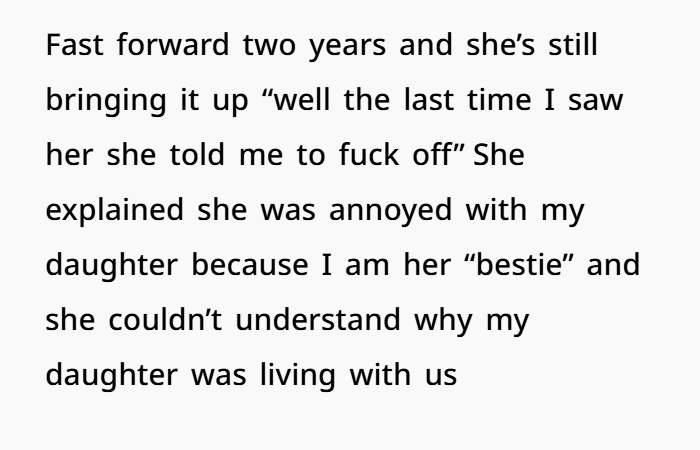
Advertisement – Continue Reading Below

Advertisement – Continue Reading Below

Advertisement – Continue Reading Below
1. The Anatomy of Possessive Friendships
The dynamics shared here strongly indicate a possessive friendship. These relationships are marked by emotional monopolization, subtle undermining of other close bonds, and an inability to coexist with new or parallel relationships. The friend’s repeated reference to being Nessa’s “bestie,” her emphasis on being the one who knows her the longest, and her hostility toward Nessa’s daughter suggest a deep-seated insecurity about her role in Nessa’s life.

Advertisement – Continue Reading Below
Research on friendship psychology by sociologist William Rawlins highlights how some friendships, particularly longstanding ones, can become entangled with identity and emotional entitlement. When someone perceives themselves as holding a unique position in your life, any new closeness—especially with a family member—can feel threatening, even if it’s entirely reasonable.
2. Misplaced Offense: When Banter Is Weaponized
The friend’s inability to let go of a lighthearted joke, two years on, raises significant red flags about emotional maturity. In social contexts, banter—playful teasing among trusted people—is not only common but often a marker of comfort and connection. According to social psychologist Dr. Dacher Keltner, humor and teasing are core tools humans use to navigate social bonds and test emotional safety. But when someone feels fundamentally insecure, even friendly banter can be reinterpreted as hostility.
The fact that four witnesses (including Nessa) all perceived the daughter’s comment as a joke further supports that the friend’s reaction was disproportionate. Her ongoing fixation on the incident could be an emotional manipulation strategy, known in psychological literature as “emotional scorekeeping”—where one clings to past slights in order to exert control or guilt.
3. Maternal Guilt and the False Choice Between Child and Friend
Nessa’s internal conflict is particularly painful: she feels torn between her daughter—who made a one-time joke—and her friend, who continues to fan the flames. This dilemma highlights a common issue for mothers navigating adult friendships: maternal guilt. The suggestion that she must choose between her child and her long-term friend is a false binary, yet the friend seems to enforce it subtly by asking, “What is she even doing here?”
This line of questioning oversteps boundaries and implies ownership of Nessa’s home and life decisions. Psychologically, this is controlling behavior, often masked as “concern” but rooted in personal discomfort. A healthy friend would not feel threatened by a mother housing her adult daughter, particularly one who moved for logistical or emotional reasons.
Advertisement – Continue Reading Below
4. Inconsistency and Absence: The Friendship Ledger Doesn’t Balance
Nessa’s mention that her friend was absent during the most important years of her life (marriage, childbirth, her father’s death) highlights a deep imbalance. This friend has no issue disappearing during critical events, yet expects unyielding loyalty and access in return. That’s not friendship—that’s entitlement.
Relationship therapist Esther Perel notes that true intimacy isn’t about who’s known you the longest; it’s about who shows up consistently. And by that measure, this friend’s track record is shaky at best. Her sporadic presence—prioritizing romantic partners over Nessa—and lack of other stable friendships suggest an emotionally dependent personality that struggles with boundaries.
5. Friendlessness as a Warning Sign, Not a Flaw
While it’s not inherently suspicious to have few friends, the pattern of cycling through people, especially when accompanied by a trail of unresolved conflict or “falling outs,” can be a red flag. The friend’s sparse wedding guest list and tendency to “drop” Nessa for new men hints at a pattern of emotional volatility or social incompatibility.
Psychologists call this interpersonal instability—a hallmark of individuals who may suffer from relational insecurity or even traits of personality disorders. It doesn’t necessarily make them malicious, but it does mean they may not have the emotional capacity for balanced relationships.

Advertisement – Continue Reading Below
6. Protecting Your Daughter’s Dignity
One of the most concerning aspects is the friend’s continued resentment toward Nessa’s daughter, now an adult. Targeting a 23-year-old for a single remark made in jest—and maintaining that grudge for two years—is an act of emotional immaturity, if not veiled aggression. It’s also deeply inappropriate.
Advertisement – Continue Reading Below
Adult children deserve to live without being made into villains by their parent’s friends. Protecting that space is part of maintaining healthy boundaries as a mother. Your daughter did nothing wrong, and validating that is crucial—not just for your daughter’s sake, but to reinforce that your emotional landscape isn’t open to manipulation.
7. Moving Forward: Setting Boundaries Without Burning Bridges
Nessa doesn’t have to choose between cutting this friend off completely or absorbing her toxicity. A middle path is possible:
- Acknowledge the History: “We’ve been friends a long time, and I value our shared history.”
- Set a Boundary: “But I won’t continue to revisit a moment that was clearly a joke to everyone involved.”
- Affirm Your Autonomy: “My daughter lives with me because it’s what’s best for my family, and I need you to respect that.”
- Call Out the Undercurrent: “It feels like you’re asking me to choose between you and my daughter. That’s not fair or healthy.”
This caused the woman to wonder what to do, but netizens told her that it’s simple – ditch the friend, not the daughter

Advertisement – Continue Reading Below

Advertisement – Continue Reading Below

Advertisement – Continue Reading Below

Advertisement – Continue Reading Below

Advertisement – Continue Reading Below

Advertisement – Continue Reading Below

Advertisement – Continue Reading Below
No, Nessa, you’re not wrong for feeling conflicted—but you’re also not imagining the toxicity. You’ve extended understanding, made room for reconciliation, and continued to engage. Meanwhile, your friend is wielding a minor slight as a wedge between you and your daughter—one of the few people who shows up for you.
Advertisement – Continue Reading Below
It’s time to stop apologizing for someone else’s emotional immaturity. A real best friend doesn’t compete with your children. She celebrates them—jokes and all.

